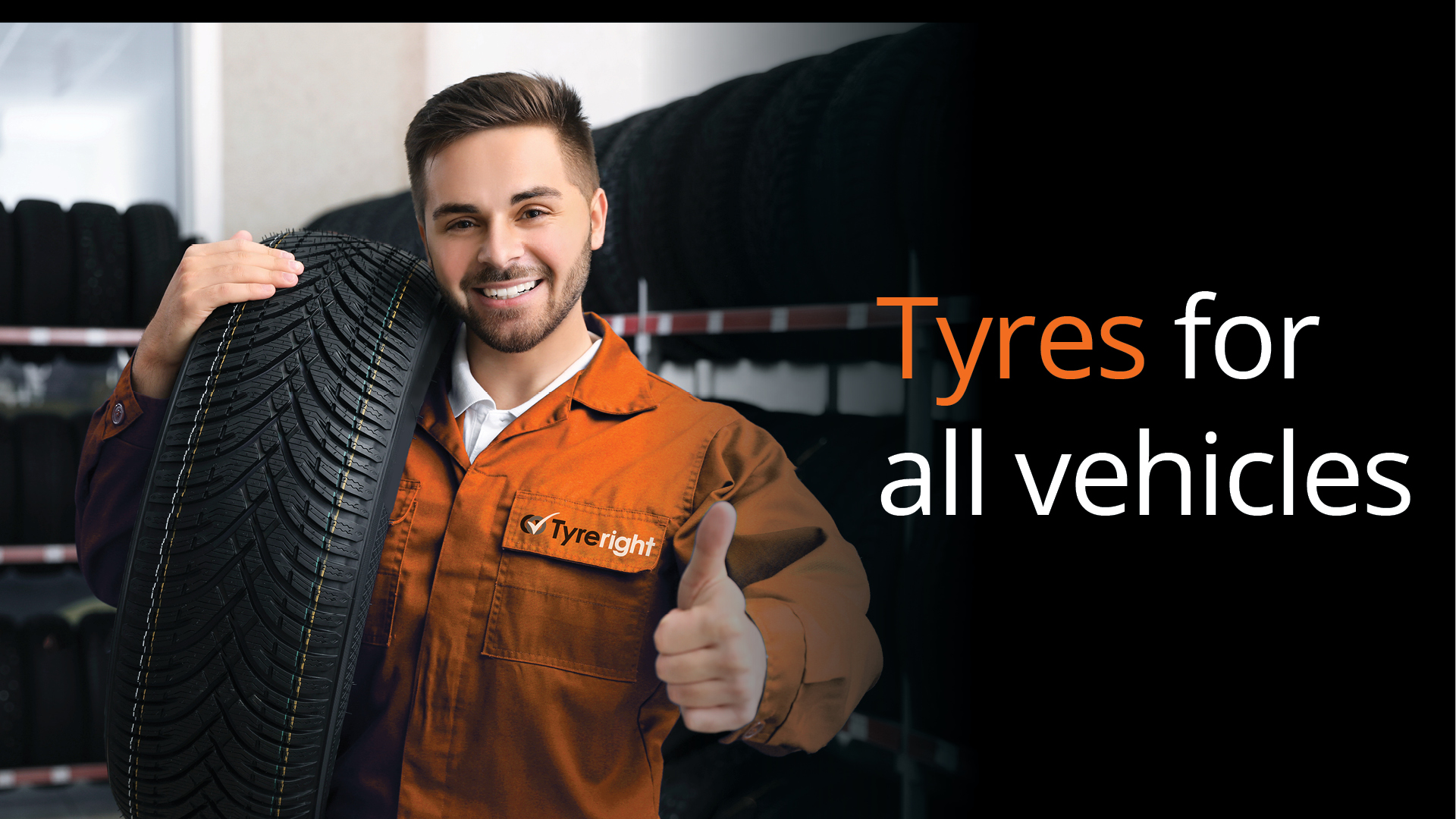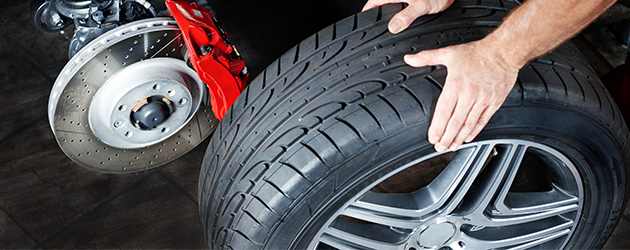Before we begin, there are a few things to remember:
1. Car tyres are crucial for your vehicle’s safety, and as such, the best way of knowing when your tyres need to be replaced is to ask the experts. If you’re worried your tyres are wearing thin, or you just haven’t replaced them in a while, find the nearest Tyreright location by heading to our store locator pages.
2. Tyres have wear indicators within the tyre’s tread. These are little raised bumps you’ll find within the grooves of your tyres. When the tyre tread is at the same height as these indicators, it’s time to replace them regardless of the tips below.
Now that’s out of the way, let’s talk about how often you should be changing your tyres.
The answer to this question depends on a few factors, from how often you drive, what type of driving you do & what type of vehicle you have all the way to what brand of tyres you currently have installed. Below, we’ve given an approximate guide to when you should look to change your tyres depending on a variety of circumstances.
It’s important to remember that there is a difference between tyre rotation & tyre replacement. A tyre rotation swaps the front and back tyres over so that all tyres wear down evenly, as the front tyres do more work than the back tyres, particularly in front-wheel drive vehicles. Tyre rotations should be conducted at least once a year, with some manufacturers even suggesting a rotation every 10,000 km.
A tyre replacement is as simple as it sounds – replace all tyres with new ones at the same time. We recommend replacing all tyres at once, as having a mix of old and new tyres can create safety issues and balance problems.
How often should you change your tyres if you spend most of your time commuting around a metro city?
Answer: Rotate every year, replace every 5 years
There’s a debate about whether motorway or city driving is better for cars in general. For your tyres, however, driving in a city is more likely to wear your tyres faster than flying down a motorway at 100km/h.
Most of us would prefer to drive to work. Driving to work is nicer than getting public transport, even with the pains of finding affordable parking. While metro driving is generally low speed, it comes with lots of starting, stopping, breaking & turning. While the low speeds generally help tyres last longer, the work done by the wheels and tyres can actually speed up the rate of wear.
At any rate, it’s recommended to have your tyres rotated by a specialist at least once a year to avoid uneven wear between the front and rear tyres. City driving tends not to cover a huge distance, so we recommend completely changing your tyres every 5 years at a maximum, or sooner if you notice the tyre tread has reached the tyre wear indicator within the tread pattern. If you are unsure how to read the tyre wear indicator or you just want that extra peace of mind, visit your local Tyreright service centre for a free tyre safety check.
How often should you change your tyres if you spend most of your time on motorways?
Answer: Rotate every year, replace every 40,000 – 50,000 KMs
As mentioned above, motorway driving is actually better for your tyres, but keep in mind that higher speeds tend to create more friction wear on tyres, so if you’re regularly travelling 100km/h or more, you may want to change your tyres sooner.
Motorways tend to be better maintained, and the consistent speeds coupled with minimal turns and lesser chance of significant braking means motorway driving generally helps tyres last longer than metro tyres.
Some tyres, such as specially-designed highway tyres, can last for up to 10 years while improving fuel economy and ride comfort. We still recommend getting your tyres checked annually by a specialist, however, a worn tyre at high speeds can lead to disaster.
How often should I change my tyres based on brand?
Answer: The cheaper the tyre, the sooner it’ll need to be replaced
You get what you pay for with tyres. It’s better to consider how much you paid for your tyres as opposed to what brand they are. Generally, the more expensive the tyre, the longer it will last. More expensive tyres also tend to handle better, have lower road noise, and have better stopping ability.
During a Canstar tyre review, Dunlop, Michelin & Goodyear tyres all came out on top for overall durability. During Choice tyre tests GT Radial tyres took the top recommendation six times over six years, and are the only tyres in Australia offering a free 5-year replacement guarantee and a 30-day test drive satisfaction guarantee.
Budget tyre brands and imported brands from Asia, are quite a bit cheaper than the likes of Dunlop, Michelin & GT Radial. As a result, they are popular with drivers who are looking for cheaper ways to run their cars. Keep in mind, however, that these cheaper tyres should really be rotated every 10,000kms, and replaced every 3-4 years or as advised by visiting your local tyre expert.
I rarely use my car, how often should I change my tyres?
Answer: Every 3-5 years maximum.
Tyres wear even when they aren’t being used, so just because you don’t use your car often doesn’t mean your tyres will last significantly longer. Rubber compounds in the tyre start to break down after five years, which is why tyres have a date of manufacture stamped into the sidewall. There are two things to consider when thinking about whether your tyres need to be replaced here:
Climate – if you live somewhere with extreme temperatures or weather, this can affect how long your tyres last. Exposure to sunlight can also impact tyre lifespan, so where possible, we recommend keeping your vehicle garaged or undercover when not in use.
Maintenance – cars that are rarely used can also be rarely maintained. Everything from brake pad wear, and tyre pressures, to vehicle fluids can be forgotten if a vehicle isn’t used much, or used for very short journeys. Consider how often you’ve actually checked your own tyres and tyre pressures. If quite some time has passed, we recommend taking your car to a specialist. Find a Tyreright franchise near you by visiting our store locator page.
Do SUV Tyres Last Longer than Passenger Tyres?
Answer: It varies.
SUV tyres are larger and tend to be capable of carrying a higher load limit than passenger car tyres, so it’s difficult to compare the lifespan between the two. It’s worth considering other factors such as the ones listed above before considering whether you should replace your tyres simply because of what type of car you use.
Generally, because SUVs tend to carry more weight than passenger cars, it’s worth getting them checked every year and be prepared to replace them every 50,000 – 75,000 KMs, or every 5 years, whichever comes first.
Get Your Tyres Checked & Replaced with Tyreright
There’s really no substitute for having your tyres regularly checked by a professional, even if you’re confident your tyres look fine. Regardless of your vehicle type, driving style, or tyre brand, Tyreright has some of the best prices across a range of styles & manufacturers. To book a time to have your tyres checked over, head to our store locator page and find the Tyreright closest to you. Alternatively, head here to find out more about the tyres available for your vehicle.
Our team of tyre experts are available to help at any one of our stores. Take advantage of our free tyre health check.








